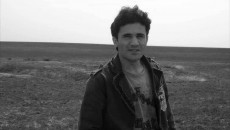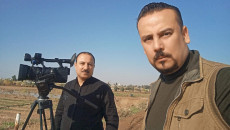Journalists working in various media organizations once again were subject to violations, their press equipment confiscated by the security forces while covering the events of the recent attack in Erbil.
On the night of Wednesday, June 8, 2022, a bomb-laden drone exploded on the main road of Piramam-Erbil, injuring three citizens, in addition to damaging several vehicles, according to what was announced by the security services in Kurdistan Region.
In a statement, the Kurdistan Security Council described the attack as a "terrorist" and indicated that the drone had taken off from the borders of the Altun Kupri district of Kirkuk province, where pro-Iran Shiite paramilitary Popular Mobilization Forces PMF are based.
During the coverage of the event, 18 reporters and photographers working for Kurdish institutions and media channels were prevented from performing their duties at the site of the explosion, as well as in the emergency hospital where the wounded were hospitalized.
Some of them said their equipment was confiscated and others said they were prevented from going into wards to interview the injured.
One of the officers spat on me and insulted me
“I was on a live broadcast when they attacked me. All the security forces who were there were beating me,” says Nabaz Rashad, Westga News correspondent in Erbil.
Rashad told (KirkukNow) that he arrived at the scene of the accident immediately and started its live broadcast, but the security forces arrested him. "After that, they released me under pressure from some parliamentarians and the public opinion. Later, I went to the hospital for treatment. I am still in pain from the effects of the beating."
Rashad says that he was insulted during his arrest.
"One of the officers spat on me and insulted me."
According to (KirkukNow) follow-up, the media organizations whose reporters and photographers have been subjected to violations include Westga Web News, Esta News, Nalia Radion and Television NRT, Galee Kurdistan GK TV, Kurdistan TV, Pargraf, Rudaw, Kurdistan 24 and Kurdish News Network KNN.
Esta News correspondent Diyar Hussein said, "As soon as we arrived at the scene and were ready for the live broadcast, we were intercepted by members of Zeravani forces." Hussein stressed that they were only prevented from covering the attack.
According to (KirkukNow) follow-up, the press equipment that had been confiscated by the security forces, was returned to the journalists late at night.
The fourth paragraph of Article Seven of the Press Law in the Kurdistan Region, “a journalist has the right to attend conferences and other public events.”
The second paragraph of Article Two of the law affirms, “a journalist has the right to obtain information of interest and related to the public interest from various sources in accordance with the law.”
KNN correspondent Abdel Wahab Ahmed says that the security forces attacked him and confiscated his camera and press equipment. "They also prevented us from entering to the emergency hospital, to which the three wounded were taken."
According to the Union of Journalists; 138 cases of violations were registered in the Kurdistan Region in 2021, including 25 in Kirkuk.
The press law in the Kurdistan Region of Iraq KRI emphasizes the need to inform the Journalists’ Syndicate before taking any action against journalists.
Farman Sadiq, Paragraf website correspondent, was also prevented from entering the emergency hospital in Erbil and obtaining information about the health status of the wounded in the attack.
“After the press conference held by the Minister of Interior, some channels went to the hallway where the wounded lay. They prevented us," Sadiq said.
Farman told (KirkukNow), "Three employees pushed me and asked for help from the Zeravani forces inside the hospital, so they took me out of the hospital."
The Press Freedom Advocacy Association in Iraq PFAA, a local Iraqi organization, recorded 280 cases of various violations against Iraqi journalists last year (May 3, 2021 to May 2, 2022), with Baghdad and Erbil provinces ranking first with 56 violations, while Kirkuk ranked the second where 37 cases were reported.
According to the report, the violations included assassination attempt, storming and armed attacks, abduction, death threats, abuse during coverage, filing lawsuits for intimidation according to laws drafted during “the dictatorship era” in reference to the rule of Baath Party chaired by Saddam Hussein, arrest and detention, beatings, prevention and obstruction of coverage, TV channel closure and illegal layoffs.
We have repeatedly emphasized that these violations are not normal and should not occur
Concerning the continued violations of journalists, Nazakat Hussain, secretary of the Committee for the Defense of Press Freedom and Journalists' Rights in the Kurdistan Journalists' Syndicate, told KirkukNow, "We discussed this issue previously with senior officials, but the violations have not come to end."
"We have repeatedly emphasized that these violations are not normal and should not occur, but according to our follow-up, violations against journalists occur around the world yet it can be reduced."
The statistics by the Kurdistan Journalists Syndicate indicate that 2021 witnessed the registration of 79 violations against journalists and media institutions, but the report of the Metro Center for Defending the Rights of Journalists mentioned 353 violations committed in 2021 against 260 journalists and media institutions.
“The issue of violations does not end because it is multi-dimensional, some of which are related to the legal vacuum, and some are related to the fact that some channels are partisan,” Hussain believes.
"We must work on those laws that reduce violations of journalists, including the law of access to information and the press law, as well as follow up for behavior of the security forces with journalists, and punishing them when they commit a violation against journalists.”
Article 4 of the Journalists Syndicate Law states that the Syndicate has the duty to facilitate journalists' access to news and information.
“Part of the problem is due to the journalists themselves as some of them lack the knowledge of their rights and their failure to register complaints in the Syndicate."
According to previous statistics obtained by KirkukNow from the Syndicate of Journalists, the Syndicate has 8,000 members. There are 31 officially registered satellite channels in the KRI, in addition to 51 websites, 138 radio stations, 259 newspapers, 695 magazines and 85 local TV channels.
The local and international organizations, human rights advocates members of the Iraqi and Kurdistan parliaments MPs expressed their grave concern that that press freedom is increasingly under threat all over Iraq including the KRI.
Iraq section of the Country Reports on Human Rights Practices: Iraq in 2021, by the Bureau of Democracy, human rights and labor, documented human rights issues based credible reports of: serious restrictions on free expression and media, including violence or threats of violence against journalists, unjustified arrests and prosecutions against journalists; serious restrictions on internet freedom; substantial interference with the freedom of peaceful assembly and freedom of association.
“A media environment in which press outlets were closely affiliated with specific political parties and ethnic factions, an opaque judiciary, and a still-developing democratic political system combined to place considerable restrictions on freedom of expression, including the press,” said the 2021 Human rights practices in Iraq by the US department of State, published last April.
“The KRG’s Kurdistan Democratic Party (KDP) and Patriotic Union of Kurdistan (PUK) prioritized access to the outlets they owned. In KDP strongholds, Kurdistan Television, Rudaw, and K24 had access to all public places and information, while in PUK-dominated Sulaymaniyah Province, Kurdsat News and GK Television enjoyed the same privilege. Conversely, outlets belonging to opposition parties or lacking party affiliation had limited access to public information in the IKR,” the report explains.







